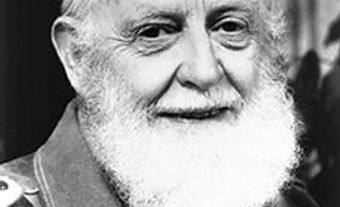
Ken Babstock, poet, editor and teacher (born 19 January 1970 in Burin, NL). Winner of the Griffin Poetry Prize and the inaugural winner of the Latner Writers’ Trust Poetry Prize, Ken Babstock is one of the most influential poets currently working in Canada.
Early Life and Career
Babstock was raised in various small towns in Ontario, including Pembroke, where his family eventually settled. He attended Concordia University in Montréal but dropped out and spent the following 12 years doing manual labour in Ireland and across Canada.
Babstock's first collection, Mean (1999), won the Milton Acorn People's Poetry Prize and the Atlantic Poetry Prize.Meanis preoccupied with the meanness of mundane human existence — how it imprisons us, threatens to kill us — and the means by which we seek, only sometimes successfully, to break free from these self-imposed jails. In "Sawteeth," for example, a gerbil runs itself out on its wheel under the "stunned" gaze of a boy, whose "cluttered" bedroom suggestively parallels his pet's "littered" cage. The poems "Finishing" and "Deck. It's a Deck" meditate on how we as human beings continually attempt to render our houses, those "bland" and "formless" self-made prisons, more aesthetically pleasing. The process is ultimately dehumanizing, stranding us on a gerbil's wheel of the mundane:
A plot of middle ground, our own paddock with
centre-post to circle around. We
work and drink and
sweat through unbridled dreams of the mean.
Days into Flatspin (2001), Babstock's second collection, won the K. M. Hunter Award. In these poems, everyday experiences and events are not always imprisoning; they can sometimes function as portals to heightened states of being. In "Carrying someone else's infant past a cow in a field near Marmora, Ont," for example, Babstock transforms this quotidian event into an elaborate meditation on human beings' relationship with the natural landscape. Similarly, "The 7-Eleven Formerly Known as Rx" is narrated from the viewpoint of a renovated convenience store, giving rise to a complex rumination on life's essential mutability and flux. Babstock's poems are dense with keen observation of minute details, and they are technically versatile, employing free verse as often as more traditional forms. "Fire Watch," a poem that mimics the difficulties of communicating via "field phone" by repeatedly using the word "Over" and inserting sections of "[inaudible]" speech, was made into a five-minute movie in 2002, directed by Anthony Wong.
Major Recognition
Babstock's collectionAirstream Land Yacht(2006) won the Trillium Book Award for Poetry and was a finalist for both theGovernor General's Literary Awardand theGriffin Poetry Prize. In this collection, Babstock retains his tight focus on everyday experiences, but in these poems the poetic personas more actively participate in and intellectually shape those experiences. An "Airstream Land Yacht," as the title poem puts it, is "sort of like a / brain" because it ranges over the landscape in much the same way that a human brain ranges over ideas and experiences. Even the structure of the collection mimics this expansiveness: it is divided into four sections, each containing several poems that explore a single syllable in the collection's title: "Air," "Stream," "Land" and "Yacht."
Methodist Hatchet (2012), Babstock's fourth collection, won the 2012 Griffin Poetry Prize and confirmed Babstock's status in Canadian poetry. The collection, fittingly named for a double-sided axe, continues Babstock's exploration of the often bewildering, kaleidoscopic connections within our contemporary world, surveying its popular culture and mediated landscapes. Babstock's characteristic voice, with its compression and quick shifts, is here imbued with a satirical lightness. Play with form and a clear attention to the music of the line is, as ever, much in evidence; Babstock himself has commented, "I'm one of those people that has [...] invested everything in sound, except that meaning won't leave me alone." In 2014, Babstock became the inaugural winner of the Latner Writers’ Trust Poetry Prize.
Babstock's poetry has been translated into several languages, including French, German, Dutch and Czech, and he has participated in numerous poetry festivals throughout the world, including the Netherlands, Germany and the Czech Republic. He is considered one of the most significant Canadian poets of his generation.
Teacher, Editor and Critic
Babstock has worked in thepoetryfaculty at the Banff Centre for the Arts and has held the post of poetry editor at House of Anansi Press in Toronto. He has also taught in various capacities at the University of Toronto and the University of Guelph (Humber), and has been a contributing reviewer of Canadian and international fiction, non-fiction and poetry at the Globe and Mail since 2004

 Share on Facebook
Share on Facebook Share on X
Share on X Share by Email
Share by Email Share on Google Classroom
Share on Google Classroom

